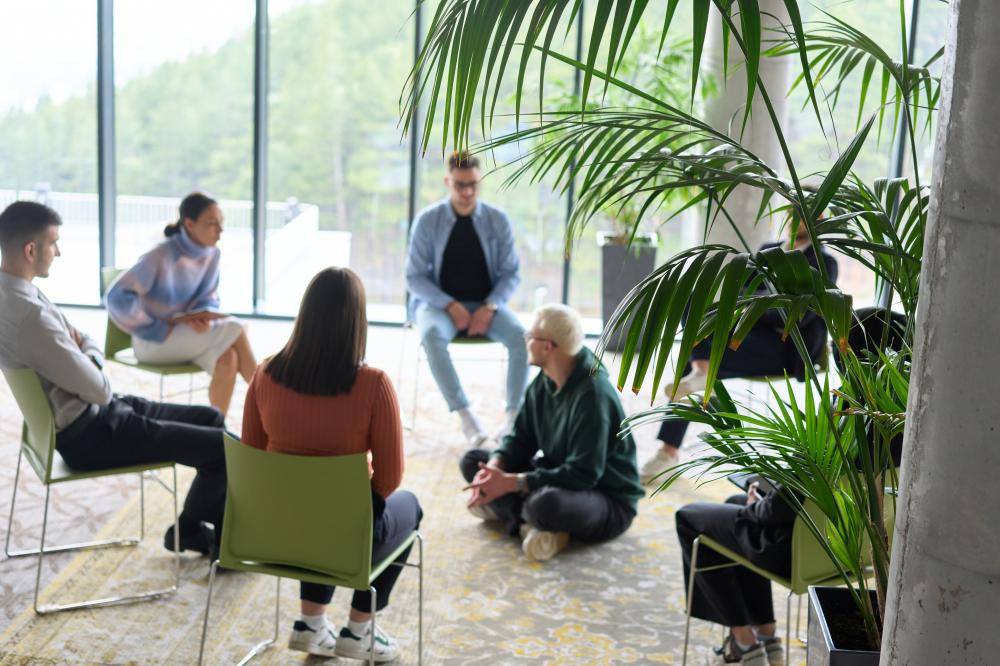
Paradise and Serenity in Recovery
At Park Bench Recovery, we pride ourselves on creating a welcoming atmosphere for those seeking a transformative journey beyond addiction. Nestled in the heart of Somers Point, our facility isn’t just a building–it’s a sanctuary that embodies hope and renewal. The serene surroundings help set the stage for inner peace, making it easier to focus on recovery.
Our center is designed to feel more like a homely retreat than a clinical environment. We want every individual who walks through our doors to feel a sense of belonging and safety. It’s not just about treating addiction at Park Bench Recovery; it’s about offering a nurturing environment for personal growth.
Personalized Treatment Paths
One size never fits all when it comes to rehabilitation. At Park Bench Recovery, every individual has a unique story, and therefore, they require a personalized approach to recovery. Our comprehensive assessments help tailor treatments to align with each person’s specific needs and life circumstances, paving the way for a more impactful recovery journey.
Whether someone is battling alcohol, opioids, or polydrug abuse, our programs adjust to the unique challenges they face. We offer a rich variety of therapies, including Cognitive Behavioral Therapy (CBT) and Dialectical Behavior Therapy (DBT), each designed to target different aspects of mental and emotional health.
The integration of Motivational Interviewing within our approach helps empower individuals to find intrinsic motivations for change, significantly enhancing the efficacy of their recovery efforts. At Park Bench Recovery, your path is truly your own.
Family Involvement and Support
We believe that family plays a crucial role in the recovery process. Addiction often impacts loved ones just as profoundly as it does the individual suffering from it. At our drug rehab Somers Point, we embrace family involvement as a cornerstone of our care model, ensuring that each person feels supported not just by our staff, but by their family as well.
Through family therapy sessions, we create a supportive space where loved ones can begin to heal and rebuild trust. It’s an opportunity to open lines of communication and set the foundation for a healthier, more harmonious family dynamic.
Integrating Social Priorities into Recovery
Recovery is not solely about abstaining from substances; it involves reintegrating into life with a fresh perspective and healthier habits. At Park Bench Recovery, we focus on social priorities, recognizing that harmonious social interactions and responsibilities form a critical part of lasting recovery.
We work closely with clients to help them redefine their role in their communities, encouraging them to find fulfillment in social engagements and activities outside of their past lifestyle. This holistic approach helps reinforce the skills and insights gained in therapy, ensuring they translate into real-world scenarios.
We often hear from clients who share their gratitude for how these social elements have enriched their lives post-rehab, providing a renewed sense of purpose and belonging. Our role is to guide them in integrating seamlessly back into their communities, thriving not just surviving.
Program Choices at Park Bench Recovery
We understand that everyone’s journey is different, which is why Park Bench Recovery offers a variety of programs to meet diverse needs. Our Partial Hospitalization Program (PHP) provides an intensive level of care for those who need structured support while still living at home.
For individuals requiring more flexibility, our Intensive Outpatient Program (IOP) is designed to accommodate work and family obligations while still providing the intensive therapy needed for recovery. Lastly, our Outpatient Program (OP) provides ongoing support for those transitioning back into daily life, ensuring they maintain progress and stability.
Each program is thoughtfully curated to provide a continuum of care that adapts as the client’s needs evolve. Our goal is to support our clients every step of the way, always keeping their individual growth at the forefront of our efforts.
Engaging in Holistic and Recreational Therapy
At Park Bench Recovery, we believe that health encompasses both mind and body, which is why we integrate holistic and recreational therapies into our treatment plans. These therapies are not just add-ons; they are vital components that address the unique needs of those we serve, helping them achieve balanced wellness.
From art and music therapy to yoga and meditation, holistic practices are interwoven throughout our programming, creating an opportunity for clients to explore different forms of self-expression and mindfulness. These activities often become a cornerstone of our clients’ new lifestyles, promoting relaxation and self-awareness.
Meanwhile, recreational therapy encourages physical activity and social bonding, two factors that significantly enhance mental health outcomes. Whether it’s team sports or nature walks, these activities are chosen based on client interests and capabilities, ensuring everyone finds joy in movement.
The Role of Therapy in Recovery
Therapy is central to our approach at Park Bench Recovery, serving as the primary vehicle for change and recovery. Cognitive Behavioral Therapy (CBT), Dialectical Behavior Therapy (DBT), and other evidence-based practices form the backbone of our clinical offerings.
These therapies guide clients in identifying and challenging harmful thought patterns, learning new coping strategies, and building emotional resilience. The therapeutic relationship is a powerful tool, providing clients with a safe space to explore their feelings and experiences without judgment.
As clients progress through therapy, they often uncover deeply rooted issues that contribute to their addiction. By addressing these factors head-on, therapy becomes a transformative experience, helping individuals rewrite their personal narratives and reclaim their lives.
At Park Bench Recovery, therapy isn’t just about treating addiction–it’s about fostering growth and facilitating profound personal transformation, helping clients emerge stronger and more self-aware.
Community-Embedded Recovery
Our recovery model at Park Bench Recovery is deeply embedded within the local community, fostering a sense of interconnectedness and collective healing. By tapping into local networks and resources, we enhance the recovery process, making it more relevant and accessible.
Through community partnerships, we provide opportunities for clients to engage in service projects and community events, instilling a sense of purpose and connection. These experiences are invaluable, encouraging clients to shift their focus outward and develop a stronger support network within their community.
Being part of a community also means clients have access to a broader range of resources, including peer support groups and local activities that can help sustain long-term recovery. At Park Bench Recovery, we believe that community is a powerful ally in the journey to sobriety, offering endless opportunities for growth and connection.
Contact Us Today
There’s no need to navigate the path to recovery alone. At Park Bench Recovery, our compassionate team is here to guide you every step of the way. Whether you or a loved one are struggling with addiction, reaching out is the crucial first step towards healing and transformation.
In the end, it’s about rewriting your story and living a life of freedom and fulfillment. Our doors are open, our team is ready, and a new chapter awaits. Don’t hesitate to contact us today to learn more about our offerings, verify your insurance, and take that pivotal step forward. At Park Bench Recovery, you are never alone.

Is drug rehab free in the US?
Many people are concerned about the cost of drug rehab, and it’s a valid concern. In the United States, some programs are indeed free, often provided by state-funded facilities, charitable organizations, or non-profits. However, these free options can have long wait times and limited availability. At Park Bench Recovery, we work closely with clients to navigate insurance options and explore financial assistance plans. Our goal is to make quality care accessible to as many people as possible because we believe everyone deserves a chance at recovery. Have you considered what barriers might be preventing you from seeking treatment, and how we could help overcome them?
Where do celebrities go for drug rehab?
Celebrities often opt for luxury rehab centers that offer privacy and high-end amenities. While these centers provide a serene environment, the treatment core remains similar–evidence-based therapies to tackle addiction. At Park Bench Recovery, while we might not be a celebrity-frequented facility, we pride ourselves on delivering compassionate and effective care tailored to each individual, ensuring every person feels like they’re receiving star treatment. It’s not about luxury; it’s about effectiveness and support. Do you value privacy and effectiveness over luxury when considering rehab options?
Can you pay to go to rehab?
Yes, many people opt to pay for rehab services, especially if they require specific programs not covered by insurance. At Park Bench Recovery, we offer a range of programs that cater to different needs, and our team can guide you through various payment options, including insurance verification and financing plans. Paying for rehab can be a significant investment in your future and well-being. If you’re weighing the costs, consider the potential benefits of living a healthier, addiction-free life. How might your life improve if you invest in the right recovery program?
What drug do they give you in rehab?
Medications in rehab are usually part of a comprehensive treatment plan to manage withdrawal symptoms or co-occurring mental health disorders. At Park Bench Recovery, medication-assisted treatment (MAT) may be employed to help manage specific substance dependencies. Common medications can include methadone or buprenorphine for opioid addiction, or naltrexone for alcohol dependency. It’s essential to understand that these medications are used in conjunction with therapies like CBT and DBT to support a holistic recovery. How do you feel about incorporating medication into a treatment plan, and what questions do you have about their role in recovery?
How do personalized treatment paths benefit recovery?
At Park Bench Recovery, we know that no two individuals are alike, and their recovery paths shouldn’t be either. A personalized treatment path takes into account your unique history, challenges, and goals, ensuring that the interventions we employ are most effective for you. This approach often leads to better outcomes because it addresses the root causes of addiction and provides targeted strategies for change. Personalized plans also adapt as you progress, ensuring that your evolving needs are met. Can you think of elements in your life that might influence the specific treatment path you need?
Why is family involvement important in recovery?
Family involvement can be a game-changer in the recovery process. At Park Bench Recovery, we see family as an integral part of the healing journey, as addiction often impacts loved ones deeply. Engaging family in therapy sessions fosters communication, mends relationships, and builds a supportive network essential for maintaining sobriety. Understanding each other’s roles and responsibilities can lay a strong foundation for a harmonious family life post-rehab. How might your family’s involvement change the dynamics of your recovery process?
What role does community play in recovery?
Community is a cornerstone of lasting recovery, and at Park Bench Recovery, we emphasize community-embedded recovery. Being part of a community offers a support network that extends beyond rehab, providing opportunities for engagement, service, and personal growth. Our partnerships with local organizations allow clients to participate in community events, fostering a sense of purpose and belonging. This external support can significantly influence one’s ability to maintain sobriety long-term. How might being part of a community enhance your recovery journey?
